Related Research Articles

Acontiinae is a subfamily of bird dropping moths in the family Noctuidae. There are more than 50 genera and 430 described species in Acontiinae, found worldwide in temperate and tropical climates.

Idia is a genus of litter moths of the family Erebidae first described by Jacob Hübner in 1813.

Elophila is a genus of moths of the family Crambidae described by Jacob Hübner in 1822.

Anarta is a genus of moths of the family Noctuidae.

Euxoa is a genus of moths of the family Noctuidae raised to Genus by the German entomologist, Jacob Hübner. The Genus is mostly confined to dry and semi dry areas in the Northern Hemisphere. There 130 species in Eurasia, a few in Africa, and 175 in North America. There are no species in the Genus in South-East Asia or in Australia. In North America, most species are found in Western regions. Of the North American species, 4 are endemic to Mexico. There is one species recorded from Chile, but this may be a mislabeled specimen. In real terms, species numbers do not equal species abundance. Some areas with few species have large numbers of the ones that do live there.
Heminocloa is a monotypic moth genus of the family Noctuidae erected by William Barnes and Foster Hendrickson Benjamin in 1924. Its only species, Heminocloa mirabilis, was first described by Berthold Neumoegen in 1884. It is found in the US state of Arizona.
Nacopa is a genus of moths of the family Noctuidae erected by William Barnes and Foster Hendrickson Benjamin in 1924.
Supralathosea is a genus of moths of the family Noctuidae first described by William Barnes and Foster Hendrickson Benjamin in 1924.
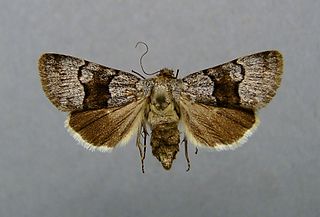
Sympistis is a genus of moths of the family Noctuidae. The genus was erected by Jacob Hübner in 1823.
Sympistis wilsoni is a moth of the family Noctuidae first described by William Barnes and Foster Hendrickson Benjamin in 1924. It is found in the Canadian provinces of Alberta and British Columbia.
Catocala consors, the consort underwing, is a moth of the family Erebidae. It is found from Maine and Connecticut south to Florida and west to Texas and eastern Oklahoma.
Drasteria petricola, the little arches, is a moth of the family Erebidae. The species was first described by Francis Walker in 1858. It is found in western North America from Yukon and the Northwest Territories south to New Mexico in the Rocky Mountains, east to Manitoba.

Pontia sisymbrii, the spring white, California white, or Colorado white, is a butterfly in the family Pieridae. It is found in mountainous areas of western Canada and the United States.
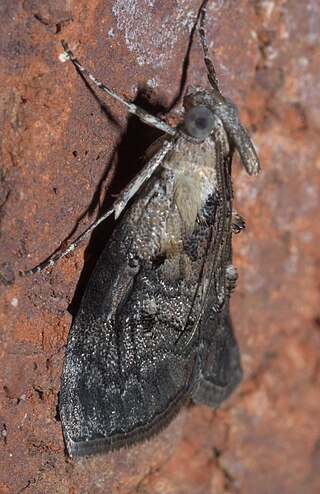
Pococera is a genus of snout moths in the subfamily Epipaschiinae, found mainly in North and Central America. It was described by Philipp Christoph Zeller in 1848.

Omphalocera is a genus of snout moths. It was described by Julius Lederer in 1863.
Omphalocera cariosa is a species of snout moth, and the type species in the genus Omphalocera. It was described by Julius Lederer in 1863. It is found from North America to Brazil.

Elophila gyralis, the waterlily borer moth, is a moth in the family Crambidae. It was described by George Duryea Hulst in 1886. It is found in eastern North America, where it has been recorded from Alabama, Florida, Georgia, Illinois, Indiana, Iowa, Louisiana, Maine, Maryland, Massachusetts, Michigan, Minnesota, Mississippi, New Brunswick, New Hampshire, New Jersey, New York, North Carolina, Nova Scotia, Ohio, Oklahoma, Ontario, Pennsylvania, Quebec, South Carolina, Tennessee, Texas and Wisconsin.
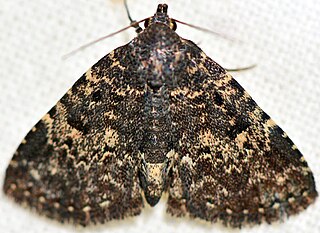
Metalectra diabolica, the diabolical fungus moth, is a moth of the family Erebidae. The species was first described by William Barnes and Foster Hendrickson Benjamin in 1924. It is found in North America, where it has been recorded from North Carolina to Florida and Arkansas to Texas.
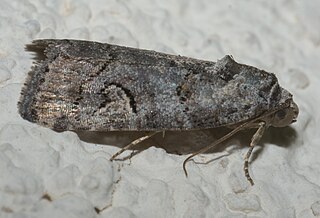
Triocnemidina is a subtribe of owlet moths in the family Noctuidae. There are about 16 genera and at least 30 described species in Triocnemidina.
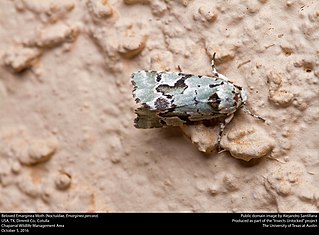
Psaphidini is a tribe of owlet moths in the family Noctuidae. There are at least 40 genera and at least 90 described species in Psaphidini.
References
- ↑ Nuss, M.; et al. (2003–2011). "GlobIZ search". Global Information System on Pyraloidea. Retrieved September 29, 2011.
- ↑ "800005.00 – 5626 – Omphalocera occidentalis – Barnes & Benjamin, 1924". North American Moth Photographers Group. Mississippi State University. Retrieved June 8, 2019.